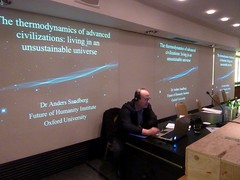October 28, 2010
Visions of the future in Milano
 I was at TransVision 2010 in Milano, meeting up with my fellow transhumanists. Giulio Prisco was of course the cornerstone, organizing everything. In principle the conference occurred simultaneously in meatspace and teleplace (despite occasional glitches - this was the first time I felt *I* got disconnected when the internet connection went down, rather than the virtual part of the conference being disconnected: a good sign!) Some of the videos are becoming available
I was at TransVision 2010 in Milano, meeting up with my fellow transhumanists. Giulio Prisco was of course the cornerstone, organizing everything. In principle the conference occurred simultaneously in meatspace and teleplace (despite occasional glitches - this was the first time I felt *I* got disconnected when the internet connection went down, rather than the virtual part of the conference being disconnected: a good sign!) Some of the videos are becoming available
My own talk was about the thermodynamics of advanced civilizations. Basically my argument was:
- Civilizations are physical objects, and nearly any ultimate goal imply a need for computation, storing bits and resources (the basic physical eschatology assumption).
- The universe has a bunch of issues:
- The stelliferous era will just last a trillion year or so.
- Matter and black holes are likely unstable, so after a certain time there will not be any structure around to build stuff from. Dark matter doesn't seem to be structurable either.
- Accelerating expansion prevents us from reaching beyond a certain horizon about 15 gigalightyears away.
- It will also split the superclusters into independent "island universes" that will become unreachable from each other within around 120 billion years.
- It also causes horizon radiation ~10-29 K hot, which makes infinite computation impossible.
- Civilizations have certain limits of resources, expansion, processing and waste heat:
- We can still lay our hands on 5.96·1051 kg matter (with dark matter 2.98·1052 kg) within the horizon, and ~2·1045 kg (with DM ~1046 kg) if we settle for a supercluster.
- The lightspeed limitation is not enormously cumbersome, if we use self-replicating probes.
- The finite energy cost of erasing bits is the toughest bound. It forces us to pay for observing the world, formatting new memory and correct errors.
- Putting it all together we end up with the following scenario for maximal information processing:
- The age of expansion: interstellar and intergalactic expansion with self-replicating probes. It looks like one can enforce "squatters rights", so there is no strong reason to start exploiting upon arrival.
- The age of preservation: await sufficiently low temperatures. A halving of temperature doubles the amount of computation you can do. You only need a logarithmically increasing number of backups for indefinite survival. Since fusion will release ~1% of the mass-energy of matter but black hole conversion ~50%, it might not be relevant to turn off the stars unless you feel particularly negentropic.
- The age of harvest: Exploit available energy to produce maximal amount of computation. The slower the exploitation, the more processing can be done. This is largely limited by structure decay: you need to be finished before your protons decay. Exactly how much computation you can do depends on how large fraction of the universe you got, how much reversible computation you can do and the exact background temperature.
- This leads to some policy-relevant conclusions:
- Cosmic waste is a serious issue: the value of the future is enormous in terms of human lives, so postponing colonization or increasing existential risk carries enormous disutilities. However, in order to plan like this you need to have very low discount rates.
- There are plenty of coordination problems: burning cosmic commons, berserker probes, entropy pollution etc. The current era is the only chance of setting up game rules before dispersion and loss of causal contact.
- This model suggests a Fermi paradox answer: the aliens are out there, waiting. They already own most of the universe and we better be nice to them. Alternatively, if there is a phase transition situation where we are among the first, we really need to think about stable coordination and bargaining strategies.
Basically, this is the "green" approach to the universe. Minimal early impact while natural complex structures are emerging, then maximal use of the resources to produce more complexity before the built-in unsustainability of the universe dominates.
[ I was intrigued today to read the review of Penrose's latest book in Nature. He argues for a scale-free cosmology where the early and very late universe are essentially identical except for scale. It is cyclic in time, but each cycle is separated by a maximal entropy state, it seems. So that cosmology doesn't allow escape from the matter decay in our current era. Still a bit uncertain how he manages to reset the entropy, though.]